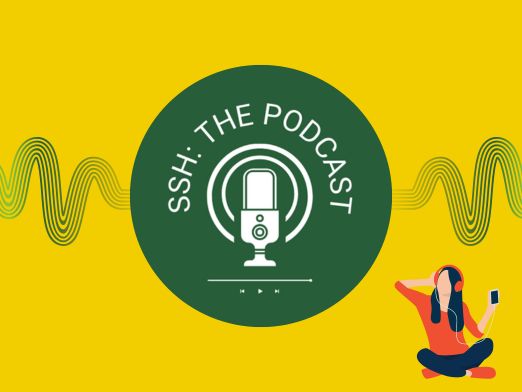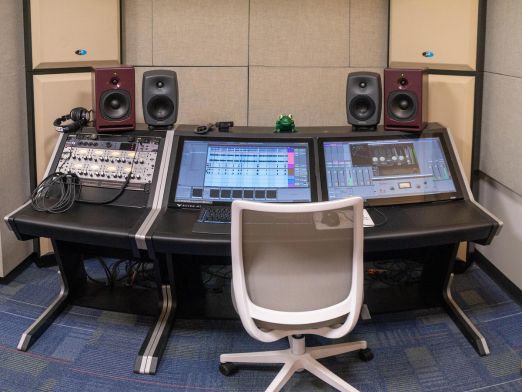College of Social Sciences and Humanities launches innovative new research-focused podcast
Carmen Rojas - 3 October 2024

Each episode of the new podcast from the College of Social Sciences and Humanities (CSSH) begins with a lighthearted invitation for listeners to settle in for the conversation ahead.
“Hello and welcome to SSH: The Podcast – or as we like to say, shhh: The Podcast,” says host Joanna Harrington, the associate dean research for CSSH.
This playful nod to the series’ name, delivered over upbeat theme music, sets the tone for the next 20-30 minutes, as Harrington leads lively and engrossing conversations with Canada Research Chairs from across CSSH.
“I was looking for a vehicle that would showcase the diversity and depth of our research and creative activities,” she says of her initial idea for the project.
Along with finding a creative way to put the spotlight on CSSH experts, Harrington also wanted an outlet that would allow the college to mobilize knowledge beyond the academy and bring its research to wider audiences.
“One of the most valuable things we have is attention time,” says Oliver Rossier, executive producer and director of the college’s Office of Research. “When Joanna suggested we try to mobilize research discussions into a podcast format, allowing us to reach busy people in new ways, I knew we had to find a way to make it work.”

The podcast format has the added bonus of utilizing the expertise of the Sound Studies Institute, including the new, state-of-the-art Sound3 Lab recording studio where the episodes are recorded.
Colleagues in conversation
Before guests enter the studio, Harrington takes time to establish a rapport with each person – meeting ahead of time to get to know them better and ask preliminary questions about their areas of research.
The result is a series that is rich in academic detail about topics of importance to society, while also inviting the personal narratives that underpin each guest’s expertise to be part of the conversation.
In the first episode, released in August, sociology professor Kevin Haggerty, CRC in Criminology and Surveillance Studies, traces the origins of his contributions to what was then an emerging field focused on surveillance back to early conversations with his RCMP officer father.
“I remember being a young man – a teenager, I guess – and talking to him in the backyard about, hypothetically, what would happen if there were cameras on the street corners?” he says. “I don’t know where that came from, but that was an interest the 17-year-old me had, and I continued that interest.”
For episode two, Harrington is joined by sociology professor Shirley Anne Tate, who holds a CRC in Feminism and Intersectionality. Early in their discussion about her work in Black diaspora studies, decolonization and Caribbean theory, Tate explains the deep connection between the values instilled during her childhood in Jamaica and the trajectory her career has taken.
“The other thing that I think was important from my upbringing was really regarding myself as a Black girl,” she says. “I was a Black girl, and that’s been really important for me to hang on to the Black-ness about myself and my Jamaican-ness – and to prize those things as well, rather than see them as shortcomings or things I need to get rid of in order to succeed.”
The newest episode, released in early October, features education professor Dwayne Donald, CRC in Reimagining Teacher Education with Indigenous Wisdom Traditions. At the outset of their conversation – which covers the ways Indigenous knowledge can enhance understanding, change how we train teachers and contribute to the building of relationships – Donald explains the influence two traditional names given to him decades ago have on his work.
The first, meaning “Far Runner,” refers to his role running between communities of people who don’t understand each other well and bringing them closer together. The second, meaning “Big Bear,” refers to both the well-known Cree chief who defied colonizers and to the bear as a symbol of healing.
“There’s a relationship between these two names – running back and forth trying to bring people closer together is about healing as well,” explains Donald. “Whenever I’m trying to make a decision about what I should be doing with my life and my work, I think about those names.”
The academy and beyond
With seven more episodes already recorded and scheduled for release in the coming months, future topics this term will include electricity regulation, social entrepreneurship and deaf education.
Harrington says reaction to the series so far has been positive (she’s even heard about a group of graduate students who are planning a listening party for the episode featuring their supervisor).
Along with the potential for the series to raise awareness of research within the college itself and across the rest of the U of A community, Harrington is also excited about the possibility of reaching even wider audiences.
With assistance from the digital curation team at the U of A Library, where the podcast is archived on its Aviary platform, episodes are available on popular streaming platforms such as Spotify, Apple Podcasts, Audible and Amazon Music. Archiving episodes on Aviary also enables their future use for educational purposes.
Harrington and Rossier note that the podcast wouldn’t have been possible without this team effort bringing together resources from across campus.
“The SSH podcast weaves together the trifecta of: celebrating some of the great research happening in CSSH, reaching new audiences and showcasing the technical capacities of research and digital teams on campus (SSI and Aviary),” says Rossier.
“I’m grateful for the faculty members who have, so far, joined us in this journey,” adds Harrington. “I’m immensely grateful to the Sound Studies Institute, particularly our audio engineer and editor Tom Merklinger and our other sound specialist (and the composer of our theme song) Nico Arnáez. Another member of our team is Lauren Bannon, the college communications lead, who designed our logo that we now see on Spotify, etc.”
“And a special thanks to Oliver Rossier – it is his behind-the-scenes work, and the juggling of us all, that has brought this idea to reality.”
Along with streaming services, current and future episodes of SSH: The Podcast can be found on the CSSH website.
To learn more about accessing the Sound3 Lab recording studio for projects, click here or contact sounds@ualberta.ca.